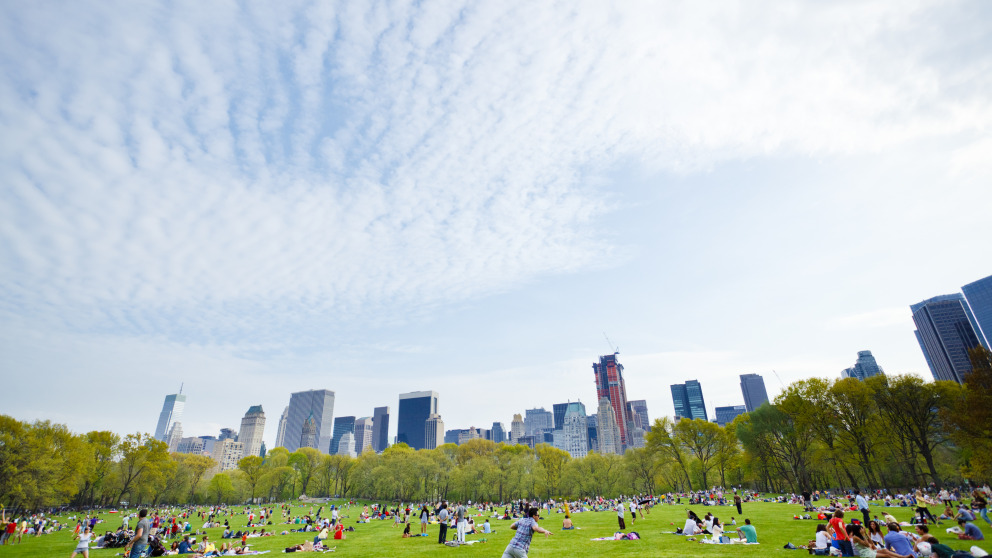One Planet, Many Futures
17.05.2019
The future has always been an important frame of reference for sustainable development. Indeed, the concept of sustainability emerged from the realisation that we need to use our planet’s resources sparingly in the interests of future generations. Many different people are working on ideas and solutions for the future and taking steps towards their implementation. But who are they? What steps are they taking? And what kind of futures do they want to bring about? These are the questions addressed by a special feature of the journal Sustainability Science.

In this issue of the journal, researchers cast light on various sustainability debates in order to enhance our understanding of action towards sustainable futures and its prerequisites. “We wanted to show how futures are being made in different areas and what problems that brings for sustainability. In the process, we discovered that people’s perception of the future is dominated by certain spheres of endeavour, such as technology and economics. The future is not seen as something that can be negotiated and shaped by society: it is, to all intents and purposes, depoliticised,” explains co-editor Anne-Katrin Holfelder from the IASS. The authors of the twelve articles analyse current attempts at future-making in their respective disciplines and make proposals for giving more prominence to sustainable futures in societal discourse and thus “politicising” the issue.
Education as “subjectification”
In her article, “Towards a sustainable future with education?”, Holfelder describes the gap between the expectations of educational institutions and the way they operate in practice. Large sections of society believe that schools and universities can educate people to create a sustainable future, but a focus on academic performance, individualisation, and short-termism stands in the way of that. What’s more, many people do not feel capable of shaping society or their own futures in the longer term. The author points out that the real potential of education for sustainability can only be realised when we conceive of education not as targeted training but increasingly as “subjectification”, where the emphasis shifts to active engagement with one’s surroundings and the facilitation of understanding. This could open up avenues to different potential futures, since pupils and students would no longer see developments as preordained or fixed and could think in terms of alternatives.
Societal debate on climate engineering
In their article, “Tools of the trade: practices and politics of researching the future in climate engineering”, Sean Low and Stefan Schäfer describe various kinds of future-making in research on climate engineering. In some of these approaches, technical and economic perspectives dominate and the future is derived from current probabilities. The authors argue that these methods need to be supplemented with approaches that involve various societal actors. This would ensure a more comprehensive, experimental and democratic approach to future developments as well as greater diversity in terms of courses of action.
Democracy is compatible with sustainability
Rosine Kelz’ article, “Thinking about future/democracy: towards a political theory of futurity”, is about the future orientation of political theories. Drawing on Hannah Arendt, Stanley Cavell and Jacques Derrida, the IASS researcher shows that democracy, open futures and sustainability are mutually reinforcing. Political theory can help us to reflect on ecological questions by creating space for questioning one’s own role in society, criticising previous decisions, and withstanding and exploiting contradictions. This goes hand in hand with a very open future, which allows us to try out more sustainable forms of coexistence.
Special Feature:
Knappe, H., Holfelder, A.-K., Löw Beer, D., Nanz, P. (2018): The politics of making and un-making (sustainable) futures. - Sustainability science, 13, 2, pp. 273–274.
DOI: http://doi.org/10.1007/s11625-018-0541-x
Contributions:
- Adloff F., Neckel S. (2019) Futures of Sustainability as Modernization, Transformation and Control. A Conceptual Framework. Sustainability Science
- Amsler S. (2019) Gesturing towards radical futurity in education for alternative futures. Sustainability Science
- Bornemann B., Strassheim H. (2019) Governing Time for Sustainability – Analyzing the Temporal Implications of Sustainability Governance. Sustainability Science
- David M., Gross M. (2019) Futurizing politics and the sustainability of real-world experiments: What role of innovation and exnovation in the German energy transition? Sustainability Science
- Esguerra A. (2019) Future Objects: Tracing the Socio-Material Politics of Anticipation. Sustainability Science
- Groves C. (2019) Sustainability and the future: reflections on the ethical and political significance of sustainability. Sustainability Science
- Hölscher L. (2019) Future Pasts. About a Form of Thought in Modern Society. Sustainability Science
- Holfelder A.-K. (2019) Towards a sustainable future with education? Sustainability Science
- Kaufmann N., Sanders C., Wortmann J. (2019) Building New Foundations. The Future of Education from a Degrowth Perspective. Sustainability Science
- Kelz R.J. (2019) Thinking about future/democracy – towards a political theory of futurity. Sustainability Science
- Longhurst N., Chilvers J. (2019) Mapping diverse visions of energy transitions: Co-producing socio-technical imaginaries. Sustainability Science
- Low S., Schäfer S. (2019) Tools of the Trade: Practices and politics of researching the future in climate engineering. Sustainability Science